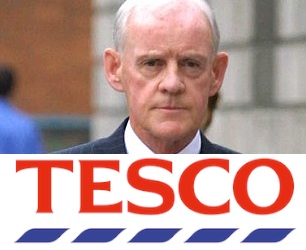
Britain’s Tesco retail chain store has been linked to factories manufacturing and selling beefburgers in Ireland containing a high percentage of horsemeat.
The news, supressed for two weeks by the Dublin government, has caused a major international scandal and raised new fears for the Irish agriculture industry.
The beefburgers were manufactured in a plant owned operated by infamous ‘beef baron’ Larry Goodman and sold in both Ireland and Britain.
The Goodman-owned ABP Group, which manufactures Tesco value beefburgers, has temporarily suspended all production at its Silvercrest plant in County Monaghan with immediate effect.
The findings by the Food Safety Authority of Ireland (FSAI) also indicated trace amounts of horse and pig DNA in meat sold by other large international retail chains.
Professor Alan Reilly, chief executive of the FSAI, said there was no health risk but ‘no reasonable explanation’ for the horsemeat -- up to 30% of the meat content -- to be contained in the Tesco burgers.
Tesco’s group technical director, Tim Smith, said his company, once informed of the test results, “immediately withdrew from sale all products from the supplier in question”.
Dublin government officials admitted they had no idea where the horsemeat came from, but pointed out that horse flesh is often consumed in other countries, such as France and Korea.
The 26-County government’s Minister for Agriculture Simon Coveney insisted there was no health risk, and urged the public to continue to purchase and consume quality Irish meat products. He blamed companies in Spain and the Netherlands for tainting the production chain in the offending plants.
Sinn Féin’s Agriculture spokesperson Martin Ferris described the news as “gravely concerning”.
“While there is no apparent public health issue people will be undoubtedly disturbed to learn that the products they are purchasing may not be what they are labelled as on the shelves,” he said.
He welcomed a commitment by Minister Coveney to launch an immediate investigation.
“We need to ensure that no long term harm is done to Ireland’s reputation for producing high quality food and that consumers are reassured about what they are purchasing in our supermarkets.”
At Westminster, British Food Minister David Heat was asked why the contamination was spotted in Ireland and not by British watchdogs. Defending British retain chains, he warned that the tainted meat may be the result of criminality.
“Because something has been discovered in Ireland, which is serious, which may lead to criminal proceedings, does not undermine the very serious efforts which are taken by retailers, by processors and by producers in this country to ensure traceability and ensure standards of food that are available to consumers,” he said.
Mr Ferris called on Minister Coveney to respond to that statement, which he said “adds a new dimension to this whole business”.
He asked: “Is the implication of what he says that the horsemeat was both criminally and knowingly imported with the knowledge of Irish or British based processors?
“It is important that the Minister comment on this given the cloud that currently hangs over the Irish beef processing industry. All information pertaining to the case must be made public.”
![[Irish Republican News]](https://republican-news.org/graphics/title_gifs/rn.gif)
![[Irish Republican News]](https://republican-news.org/graphics/title_gifs/harp.gif)

